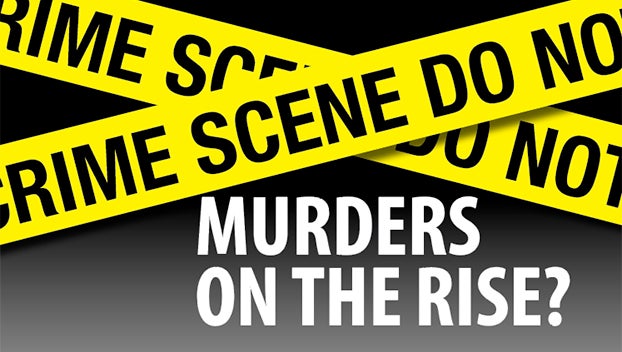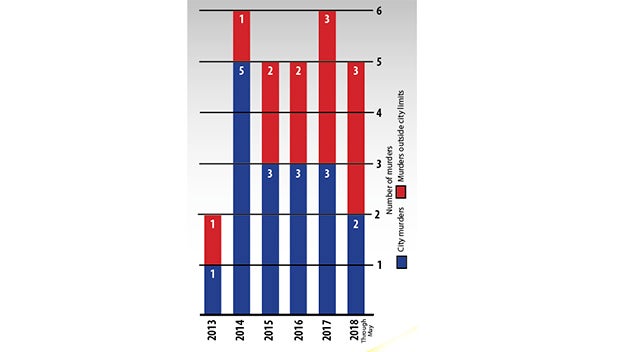Sunday focus: Law enforcement discusses community violence, murder rate
Published 11:07 pm Saturday, June 9, 2018
NATCHEZ — At 2018’s halfway mark, the number of homicides in the city and county has almost reached year-end totals from previous years.
In 2017, six people were victims of homicide in Natchez and Adams County, but in just the first six months of 2018, five people have been murdered.
In the last three years, the city of Natchez had three murders per year. Only six months into 2018, however, two people have already become the victims of homicide.
Three people were killed in 2017 in Adams County, but this year, the county has already investigated that number of murders.
The spate of violence in the spring of 2018, Adams County Sheriff Travis Patten said, is just the latest in a trend of increasing brutality.
Local law enforcement officers say they are doing what they can to reduce criminal activity, but Patten said the reasons for an increase in violence, if one exists, are murky. And the responsibility to deter crime in the area is on everyone.
Is there an increase?
Natchez Police Department Capt. Scott Frye said he believes violence is not on the rise in Natchez, but that the immediacy of social media can make it appear that way.
“You see all the violence on social media, and you tend to think that crime is going up, but it’s not,” Frye said. “It’s sustaining.”
Frye, who joined the Natchez Police Department in 1994, said the highest number of murders he has seen in one year was six, and that was in his first year.
Since, the number of killings each year has wavered between one and three, with a few outliers.
In 2014, five people were murdered in the city limits, in 2011, four, and in 1998, zero.
Outside of these aberrations, however, the number of homicides rarely rises higher than three.
In the county, however, the past five years have displayed a persistent rise in homicide.
In 2013 and 2014, only one person was killed each year. That number increased to two in 2015 and 2016, and three in 2017.
Now, halfway through 2018, three people have already died violent deaths.
“I think the last couple of years have been really active,” Patten said. “People have been using guns to solve their problems.”
Reasons for the rise?
Patten said he believes the steady increase in violence in the county has three primary factors: Mental health, poverty and education.
Of the three homicides in 2017, Patten said he could attribute at least two to a lack of mental wellness or stress.
Unchecked anger or withheld aggression, Patten said, can sometimes culminate in an act of violence.
“I think a mental health facility would help some of this, but you have communities who believe talking to a psychiatrist is taboo,” Patten said. “We are going to have to keep educating people. It’s like a cold that you treat. It’s no different with mental health.”
Poverty and education, too, can sometimes drive people to violence, he said.
“When people … get put in a predicament that they feel their kids need to eat and they have no place to turn, they will go after yours to take care of theirs,” Patten said. “I’m not saying all poor people are bad — by no means. But when they can’t feed their families, they sometimes take the route of least resistance.”
Gang violence, Patten said, is also a factor in violence in the city.
“Anybody who says we don’t have gangs in Natchez is deluding themselves,” Patten said. “Natchez has gangs just like anywhere else in America.”
Though not as prevalent as the other factors he named, Patten said gang violence has played a role in some of the homicides over the past years.
“I tell people this all the time, but those were not random,” Patten said. “The shooter intended to shoot the person that they shot. In some cases, I do think that was retaliation.
Society’s attitude toward violence and retaliation, Patten said, plays a role in devaluing life.
“People feel like they are freer now to do things than they did years ago,” Patten said. “There has been a complete lack of respect and everybody is reacting to that accordingly. When our leaders — from the president down — start to show respect and compassion for people, maybe people will start showing it back. Until change starts happening in those areas, it’s hard to say what you need to do to make people start having a regard for life.”
And yet, as first responders, Patten said he and his deputies look for ways to deter crime.
Response
For Frye and the Natchez Police Department, hindering crime begins with the criminal.
“The goal is, if you’re violating, we’re putting you in jail,” Frye said. “If you’re shooting guns in the city, we put you in jail. We try to stay on top of it. If we get an increase in an area, we concentrate and work on it until we can get those accountable.”
Patten, too, has increased patrols, including a special narcotics unit that patrols the city.
When violence seemed to break out consistently across the city and county in early 2018, Patten said he decided he had to do something.
“I actually assigned three different officers who come out sporadically throughout the week and do nothing but city work,” Patten said. “(They) just deal with the stuff that’s happening in the city. Every time these guys go out, they take guns and dope off the street.”
Patten said he can increase patrols and crack down on offenders, but some of the responsibility must also fall on members of the community.
“Our response is, you’re going to have to police your own people as well,” Patten said. “It’s everybody. The community needs to help in this. This needs to come from community leaders, churches, and of course, everything starts at home.”
Preventing violence, Patten said, can be as simple as destigmatizing mental health care within the home, or seeing the signs of a flaring temper.
“As far as the community goes,” Patten said, “we can continue to educate them on the signs, but we need them to engage their own people.”








